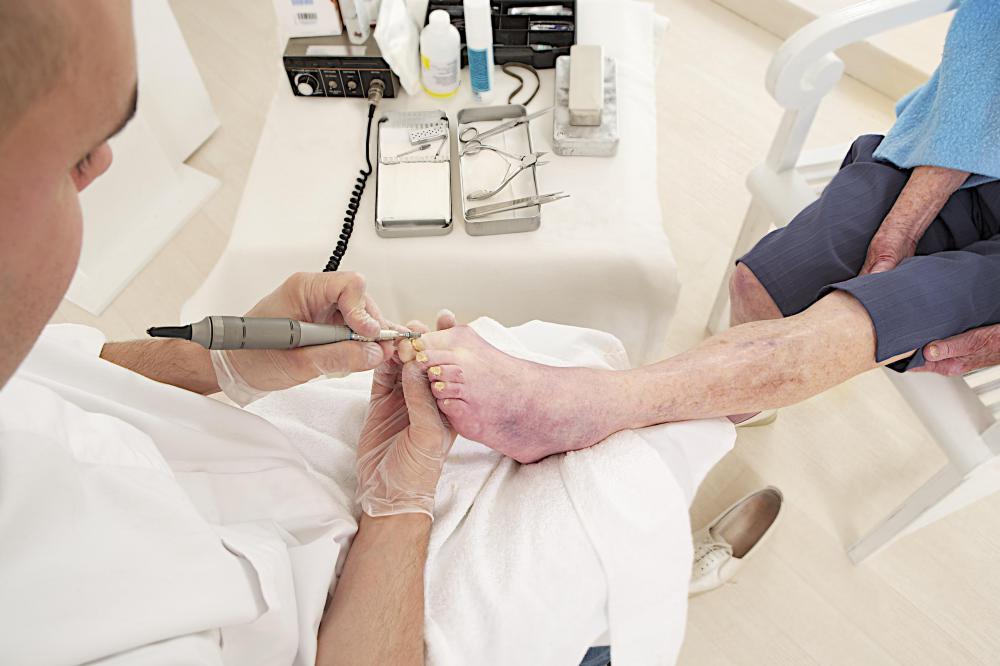At WiseGEEK, we're committed to delivering accurate, trustworthy information. Our expert-authored content is rigorously fact-checked and sourced from credible authorities. Discover how we uphold the highest standards in providing you with reliable knowledge.
How do I Choose the Best Podiatry Courses?
There are three items to consider when looking for the best podiatry courses: accreditation, faculty, and target audience. Podiatry courses are available from universities, community, career colleges and community centers. Podiatry is the study of the human foot.
When looking for podiatry courses, the first item to check is the accreditation status. An accredited school has had its academic and administrative policies reviewed by an independent third party. Courses from an accredited school can be transferred to other post-secondary institutions. The professional podiatry association accepts continuing education courses completed at this type of school.

Review the qualifications of the faculty or course instructors. Most schools publish biographies of their faculty, listing their academic credentials, experience, publications, and areas of expertise. Take the time to review this information to obtain valuable background on their areas of expertise, expectations, and focus. Although qualified podiatrists teach many podiatry courses, bio-mechanical engineers, medical doctors, nurses, and other health services professionals also teach some related courses.

People who report the highest level of satisfaction with podiatry have a clear understanding of the course expectations and audience. There are three possible audiences for podiatry courses: a layperson with a personal interest in the foot, a podiatry assistant, and a podiatrist. Each of these students has a very different background and reason for taking a podiatry course. It is very important when looking for the best podiatry course to make sure that you read the course description and have the background necessary to understand the course material.
A course intended for a layperson might be offered at a community center or local education center as a personal interest course. Items covered may include the structure of the foot, common foot issues, choosing shoes, and the role of the foot in balance and mobility. There is rarely a test or examination in these types of courses.
Courses for a podiatry assistant are available at a community or career college. These courses may be part of a program to become a podiatrist assistant, or continuing education for program graduates. Subjects covered include common foot issues, how to size a foot correctly, and when to refer the client back to the podiatrist.
The podiatry courses offered at the university level are for podiatrists, both before and after graduation. The total program to become a podiatrist is two to four years in length. Post-graduate programs form part of the licensing requirements for practicing podiatrists.
AS FEATURED ON:
AS FEATURED ON:












Discussion Comments
@Mor - There's no excuse not to do this kind of reputation checking when you've got the internet available to you. It wouldn't be that difficult to find a podiatrist forum with active members who could give you the heads up on how they managed to get where they are today.
This is especially useful if you can find anyone who has had to hire a podiatrist before. They will have personal knowledge of the mistakes people make in choosing a course, and where they would consider the best place for you to study.
Plus, you will also be able to ask what the job will be like before you spend money on the course that you choose.
@pleonasm - I would make very sure to check whether those people realize they are supposedly on the pay roll of the course though.
I don't mean to be cynical, but a lot of courses, particularly online courses, will use big names that they know will bring in respect without actually hiring the person.
Or maybe they'll be tricky about it and only bring the person in for one lesson, but advertise them as a teacher there.
Double checking on a school's credentials is essential, if you don't want to end up with student debt and a useless degree. Don't just check up on their teachers either. I would look for what their general reputation is among people who are working in the field you want to go into.
Honestly, I would say for almost any course the first thing to check out is who is working there. It would be no different for podiatry training.
If the course has well qualified people, with a good range of different specialties that's a very good sign that the people running the course are willing to put money into getting you the best resources.
Your teachers are going to make the difference between whether or not you learn as much as you hope.
And when it comes right down to it, sometimes the name of a well known and respected professional on your references can open doors that might otherwise remain closed to you.
I personally think this is the single most important aspect to any course.
Post your comments